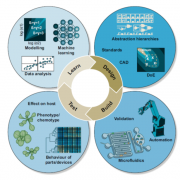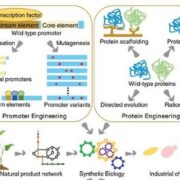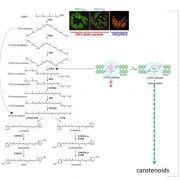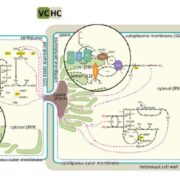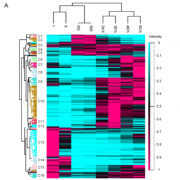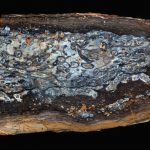Conversion of Escherichia coli to generate all biomass carbon from CO2 (Cell)
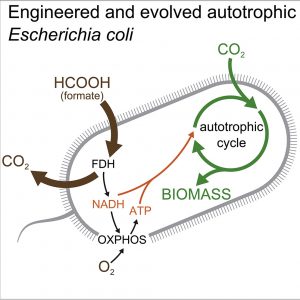 Plants are photosynthetic autotrophs, meaning they use light energy to feed themselves, with carbon dioxide as a carbon source. Heterotrophs like E. coli require organic carbon. Here, Gleizer et al. have rewired the metabolism of E. coli to make it into a (non-photosynthetic) autotroph, meaning it can build organic molecules using only CO2 as a carbon source. It does however require formate (HCOOH) as a source of energy and reducing power. Following the initial rewiring, cells still required xylose and were not autotrophic, so the authors then used a directed evolution approach by providing decreasing amounts of xylose in the growth medium over successive generations until the cells achieved full autotrophy. The authors sequenced the genomes of the autotrophic lines to learn which genetic changes had been selected. (Summary by Mary Williams) Cell 10.1016/j.cell.2019.11.009
Plants are photosynthetic autotrophs, meaning they use light energy to feed themselves, with carbon dioxide as a carbon source. Heterotrophs like E. coli require organic carbon. Here, Gleizer et al. have rewired the metabolism of E. coli to make it into a (non-photosynthetic) autotroph, meaning it can build organic molecules using only CO2 as a carbon source. It does however require formate (HCOOH) as a source of energy and reducing power. Following the initial rewiring, cells still required xylose and were not autotrophic, so the authors then used a directed evolution approach by providing decreasing amounts of xylose in the growth medium over successive generations until the cells achieved full autotrophy. The authors sequenced the genomes of the autotrophic lines to learn which genetic changes had been selected. (Summary by Mary Williams) Cell 10.1016/j.cell.2019.11.009


